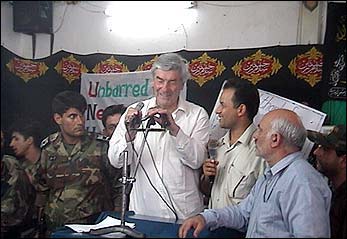Lubbers discusses repatriation with Iraqi refugees in Iran
Lubbers discusses repatriation with Iraqi refugees in Iran

BASRA, Iraq, July 22 (UNHCR) - A pilot return convoy from Iran to Iraq could be organised as early as next month, according to UN refugee agency chief Ruud Lubbers. At the same time, he warned of the many obstacles that still need to be overcome, and reiterated the need for a gradual approach to Iraqi repatriation.
High Commissioner Lubbers is currently visiting the Iraq region to find ways to facilitate not just the safe return of Iraqi refugees from neighbouring countries, but also their successful long-term reintegration into Iraq.
To get a better sense of Iraqi refugee sentiments in the region, Lubbers on Monday travelled to Ashrafi refugee camp in Khuzestan province, south-western Iran. Many of the 11,000 Iraqis there have expressed a strong desire to repatriate without delay.
During a packed meeting in the camp's main mosque, the High Commissioner told the refugees that he hopes UNHCR will be able to organise the first pilot return convoy to Iraq some time in August, but cautioned that this was an ambitious goal and that there were still obstacles to overcome. These range from the security situation to the lack of basic services, as well as the absence of public institutions to identify and register returning refugees.
Lubbers also stressed that the UNHCR voluntary repatriation programme to Iraq will be small to begin with. He added that it is crucial for the first returns to be well-managed and secure, opening the way for a larger-scale programme to begin next year.
"This is the beginning of a process that will not be easy, but I am determined to make it a successful operation," said the UNHCR chief. "We will start with hundreds, then with thousands, then with tens of thousands, until we get the job done."
Even before UNHCR's planned pilot run, small numbers of Iraqi refugees have been returning home from the Islamic Republic of Iran on their own.
"If refugees are determined to return, nothing can stop them," said Mohammad Adar, who heads UNHCR in Southern Iraq. "UNHCR knows from experience in other crises that the ones closest to their home country are the ones most likely to return first."
On Tuesday, High Commissioner Lubbers arrived in Basra, Southern Iraq, through the Shalamsha border crossing, where a few Iraqi refugee families have been heading home every week.
The UN refugee agency has repeatedly said it wants to avoid large-scale returns to post-war Iraq, which currently does not have the capacity to absorb large numbers of returnees.
During the High Commissioner's first visit to Basra last weekend, he discussed these challenges with representatives of the Coalition Provisional Authority (CPA), who are also concerned that the necessary arrangements should be in place before returns start. UNHCR, for its part, will put an emphasis on going to the villages and cities where refugees want to return, to discuss the practicalities of reintegration with the local authorities and inhabitants.
Security remains a pressing issue, a fact underlined by the recent killings of an ICRC (International Committee of the Red Cross) international staff member and an IOM (International Organization for Migration) local worker, both to the south of Baghdad.

Adequate security will be a vital factor if UNHCR is to carry out its important role in facilitating refugee returns. The planned return of the first group of Iraqi refugees who have been living for more than a decade in Rafha camp in the Saudi Arabian desert has already been delayed for similar reasons.
Another group of concern to UNHCR is the 100,000 refugees from other countries living in Iraq. Over the weekend, Lubbers visited Turkish refugees at Makhmour camp in Northern Iraq, as well as a centre for Palestinian refugees who had been evicted from their homes in post-war Baghdad. He also spoke to some Iranian refugee families who had fled harassment in their settlements in Southern Iraq and were waiting to go back to Iran from a transit centre outside Basra.
The High Commissioner concludes his mission to the Iraq region with a last stop in Kuwait, an important logistical base for UNHCR relief and reintegration supplies, and which could be a transit country for some returning refugees (including those in Saudi Arabia). He returns to Geneva on Thursday.








